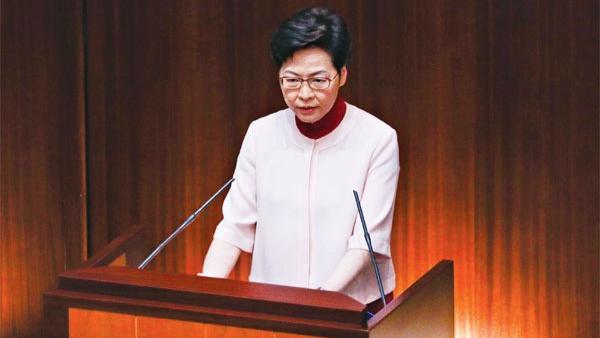 Chief Executive Carrie Lam Cheng Yuet-ngor delivers the 2021 Policy Address at the Legislative Council, Hong Kong on Oct 6, 2021. (CALVIN NG / CHINA DAILY)
Chief Executive Carrie Lam Cheng Yuet-ngor delivers the 2021 Policy Address at the Legislative Council, Hong Kong on Oct 6, 2021. (CALVIN NG / CHINA DAILY)
Officials, scholars and business leaders said the increase of the land supply in Hong Kong for tech companies and research institutions as proposed in the latest Policy Address would bolster the city's innovation and technology development and help attract more talent to the city.
In her Policy Address on Wednesday, Hong Kong Chief Executive Carrie Lam Cheng Yuet-ngor proposed consolidating the Hong Kong-Shenzhen Innovation and Technology Park and the areas around Lok Ma Chau and San Tin to form the San Tin Technopole, providing 240 hectares for inno-tech development. The move would enlarge the 87-hectare Innovation and Technology Park, in the Lok Ma Chau Loop, by about 150 hectares.
She also proposed providing 88 hectares to expand the Hong Kong Science and Technology Park to offer more space to tech companies and startups.
Development of the San Tin Technopole would enable Hong Kong and Shenzhen to better leverage their comparative advantages, said Tang Heiwai, a professor of economics at the Business School of the University of Hong Kong and associate director of the Hong Kong Institute of Economics and Business Strategy. While Hong Kong excels in high-end services and basic science research, Shenzhen and some other places in the Guangdong-Hong Kong-Macao Greater Bay Area are developed in applied science and the industrial use of technology, he said.
"It's very good news and exciting. The Policy Address is more ambitious than previous ones," Tang said, adding that he expects to see more specific measures on how to attract talent to the city.
Witman Hung Wai-man, principal liaison officer for Hong Kong at the Shenzhen Qianhai Authority, said the Policy Address has positioned Hong Kong's economic development as finance- and technology-driven, prodding the government to accelerate building the San Tin Technopole by carrying out consultations, amendments and construction simultaneously.
He also suggested the San Tin zone use a leasing method in the form of industrial estates, instead of the current office-building-dominated format, so that the design of the new industrial areas such as height, weight bearing and electricity can better meet companies' needs.
ALSO READ: CE outlines visionary Northern Metropolis plan
Better use of strengths
The Policy Address also proposed setting up an InnoLife Healthtech Hub in the Innovation and Technology Park at the Loop, comprising more than a dozen labs to make better use of its strengths in life and health sciences.
Hong Kong has a solid foundation for biotech development, backed by leading research capacities of top-notch universities and the richness in biomedical and biotech research and development laboratory facilities.
Data Ng,
founder and CEO of Printact
Hong Kong has a solid foundation for biotech development, backed by leading research capacities of top-notch universities and the richness in biomedical and biotech research and development laboratory facilities, said Data Ng, founder and CEO of Printact, a startup providing technology education with a focus on science, technology, engineering and math, as well as biotech.
"It is very nice to upgrade the infrastructure so that more world-class R&D can stay in Hong Kong as well as attracting more related talents to the city," he said, adding that Hong Kong has advantages in diagnosis, medical and pharmaceutical in terms of biotech, biomedical and medical technologies.
Hong Kong-based think tank Our Hong Kong Foundation envisages the city as an innovative hub for biotechnology. "After highlighting biotech as one of the four major areas of science and technology development in 2018, the government has for the first time focused on leveraging Hong Kong's strengths in life science and health research and introduced a number of measures to support the development of the industry. The pledge to establish the InnoLife Healthtech Hub showcases the government's commitment to the development of the industry where Hong Kong enjoys advantages."
The measures to develop the northern part of Hong Kong into a metropolitan area stand out more than in previous policy addresses, representing the government's dedication to further integrate the city's tech development into the Greater Bay Area, said Justin Jim, chief director of International Youth Maker Alliance of Hong Kong and co-founder and chief strategy officer of autonomous driving startup Unity Drive.
READ MORE: Initiatives to cement HK’s global financial hub status
To support basic research, the Policy Address also proposed reserving a 4-hectare site at Pok Fu Lam for the University of Hong Kong to construct facilities for deep technology research and supporting the Chinese University of Hong Kong's effort to use a 2.5-hectare site in the vicinity of the CUHK Medical Centre to build research facilities and expand its Medical Centre.
Zeng Xinlan contributed to this story.


